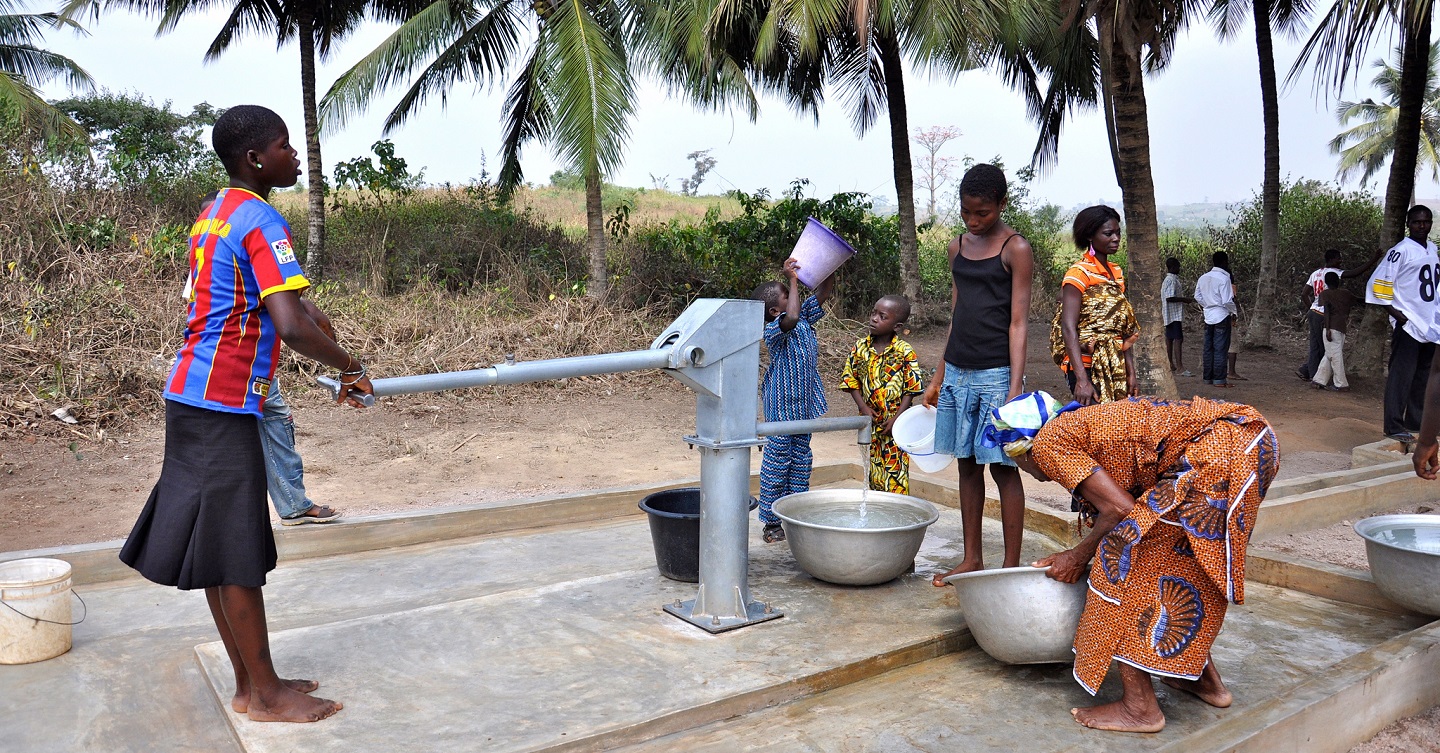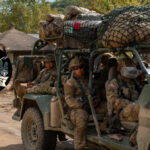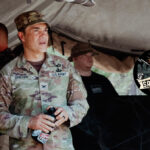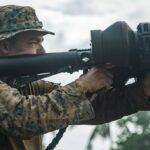
EDITOR’S NOTE: This episode was recorded before the sudden fall of Afghanistan to Taliban forces, making some of the thoughts of women’s influence in the region and human security even more important to consider.
“Nothing is softer or more flexible than water, yet nothing can resist it.” – Lao Tzu
As this episode is released much of the United States is recovering from the wrath of Hurricane Ida. At the center of most of the destruction is water. It overflowed from banks, surged towards shores, destroyed property, knocked out power and swept loved ones away. In its wake, in the midst of a staggering overabundance of water one of the most sought after resources is fresh drinking water.
It’s no exaggeration to say that water has been a motivating force in Sarah Petrin’s personal and professional life since the day she was born. She joins Editor-in-Chief Jacqueline Whitt to explain why the resource has dominated so much of her life and is the basis for her book Bring Rain: Helping Humanity in Crisis.
The village chief brought his entire family to the mission hospital where I was born and when they brought me back to the village. All the elders held a rain dance to welcome me back and prayed that I would end the drought in the dry season and I would bring them rain.
Podcast: Download

AN ADDENDUM ON HUMAN SECURITY AND AFGHANISTAN
By Sarah Dawn Petrin, August 29, 2021
When this podcast was recorded, we did not know that the fall of Kabul was imminent. What does “human security” mean in the context of the U.S. departure from Afghanistan?
Evacuation operations at the Hamid Karzai International Airport (HKIA) have been nothing short of heroic. Images from the airport reveal the human nature of U.S. service members as they held babies, accompanied families, and came alongside women in danger.
In the podcast, I tell the story of when a woman left her child at a Forward Operating Base (FOB) in Afghanistan. What did the soldiers do? They took the child in and tried to care for its needs. They quickly realized the FOB was no place for a baby, so they tracked down the mother.
When everything goes wrong, sometimes the only thing we can offer is our own humanity. This sense of moral obligation to help people in distress has brought together the private sector, members of Congress, veterans, and advocates to support the military in getting as many evacuees to safety as possible.
Understanding human security is about analyzing how conflict and other destabilizing events affect a population. People of different age, gender, language, race, ethnicity, religious, and political groups are going to be affected in distinct ways. Understanding the risks and vulnerabilities of each group is an important factor in the protection of civilians. Realizing that threats to civilians come in numerous forms – not only from armed groups like the Taliban – but also from environmental and health risks, is an important consideration for military operations.
The accompanying white paper on Human Security in U.S. Military Operations, argues that human security is a useful planning tool for anticipating the human dimension of operations. While the U.S. understood that the military departure from Afghanistan would pose a risk to certain vulnerable populations, the assumption that the government of Afghanistan would be able to protect the people is where things went wrong. The U.S. overestimated partner capacity because it so heavily invested in building that capacity together with its NATO allies.
The collapse of the Government of Afghanistan will be a subject of debate for years to come. In the meantime, U.S. evacuation operations have brought together resources from across the interagency to address critical humanitarian needs. As thousands of evacuees wait for their Special Immigrant Visa (SIV) paperwork to be approved, and others escape to neighboring countries, Operation Allies Refuge is far from over.
There will always be human dimensions of military operations that are critical to achieving the end state. Whether or not we consider the implications of military action on civilian populations, and how we prepare for a coordinated response with interagency partners, is an important factor for operational success that is not going away anytime soon.
A PDF copy of the above addendum is available here.
Sarah Dawn Petrin is a former Peace Operations and Human Security Analyst at the U.S. Army Peacekeeping and Stability Operations Institute. She has advised the U.S. military and NATO on developing strategy, policy, and doctrine for the Protection of Civilians and Women, Peace, and Security. She has twenty years of operational experience in conflict zones in Africa, Asia, Eastern Europe, and the Middle East. Her first book, BRING RAIN: Helping Humanity in Crisis, was released in March 2021.
Jacqueline E. Whitt is an Associate Professor of Strategy at the U.S. Army War College and the Editor-in-Chief of WAR ROOM.
The views expressed in this presentation are those of the speakers and do not necessarily reflect those of the U.S. Army War College, U.S. Army, or Department of Defense.
Photo Description: USAID installed a water pump in this African village, giving ready access to clean water.
Photo Credit: Photo courtesy of USAID





In the first part of the “Introduction” section to Sarah Petrin’s June 2021 PKSOI PAPER “Human Security in U.S. Military Operations: A Primer for DOD,” she notes:
“The U.S. Government does not have a definition of Human Security and the term is not defined in international law. However, the origin of the term is derived from a speech by former U.S. President Franklin E. Roosevelt. In this “Four Freedoms” speech to Congress in 1941, Roosevelt made the case form the U.S. intervention in World War II to stop the advance of Hitler in Europe. The freedoms that Roosevelt described include:
1. Freedom from fear.
2. Freedom from want.
3. Freedom of speech.
4. Freedom of religion.
These freedoms are often described by the United Nations as forming the basis for Human Security, a term that recognizes human beings need a combination of physical security, human rights, and development to be safe from harm.”
Let us take a look at another — possibly related — quote from FDR (who was a serious anti-imperialist indeed?):
“Imperialists don’t realize what they can do, what they can create! They’ve robbed this continent (Africa) of billions, and all because they are too short-sighted to understand that their billions were pennies, compared to the possibilities! Possibilities that must include a better life for the people who inhibit this land.”
(From Niall Ferguson’s “Colossus: The Rise and Fall of the American Empire.”)
As one might discern from the two quoted items provided above:
a. FDR’s concern with the lack of “human security” by various populations throughout the world; this would seem to be based, at least in part, on:
b. His desire for the vast amounts of money that the U.S. and other developed countries might procure from these such populations — once they became more “modernized”/”westernized”/”developed.”
Problem:
As Samuel P. Huntington notes in his famous 1967 “Political Order in Changing Societies” (therein, see Page 41) (a) efforts of a country to become (or to cause someone else to become?) “modernized”/ “westernized”/”developed, this routinely leads to (b) instability and violence.
“The apparent relationship between poverty and backwardness, on the one hand, and instability and violence, on the other, is a spurious one. It is not the absence of modernity but the efforts to achieve it which produce political disorder. If poor countries appear to be unstable, it is not because they are poor, but because they are trying to become rich. A purely traditional society would be ignorant, poor, and stable.”
Bottom Line Thought — Based on the Above:
Thus, if we agreed with Huntington’s thoughts above — and thus were really more concerned with “human security” rather than “profits” (this, whether we were involved in military operations in these locales or not) — then, rather than pursuing “development,” etc., should we not, instead, adhere to the “make as few changes as possible” guidance provided by international law here:
“These questions have arisen in various conflicts and occupations since 1945 — including the tragic situation in Iraq since the United States–led invasion of March–April 2003. They have arisen because of the cautious, even restrictive assumption in the laws of war (also called international humanitarian law or, traditionally, jus in bello) that occupying powers should respect the existing laws and economic arrangements within the occupied territory, and should therefore, by implication, make as few changes as possible.”
(See the first two paragraphs of Sir Adam Roberts “Transformative Military Occupations: Applying the Laws of War and Human Rights.”)
To (hopefully) help illustrate some of the points that I am trying to make above, consider the following from a 2011 International Committee of the Red Cross Report on Afghanistan:
“Before we enter the next phase of Afghanistan’s history, aid organizations and donor governments would be wise to reflect long and hard upon the errors in assumptions and judgement that have led to the present state of affairs. As both the US government and the Taliban recognize, providing goods and services to populations in need of them can do much to ‘win the hearts and minds’ of local people and create environments conducive to peace and reconciliation. But if aid is provided as part of a political or military strategy, it is treated as such, and the policy backfires when villages are ‘punished’ for having received it or aid agencies are attacked as agents of the enemy’s agenda. It is useful to hear how aid agencies are perceived today. On asking an anti-government tribal leader — whom he first met in the mountains of Afghanistan in 1987 — whether the ICRC could travel safely in the area under his control, a senior ICRC delegate received the following reply:
‘Today, like 20 years ago, a government and its international allies are trying to impose a model of society, with all the modernization, reconstruction, development and Western values that go with it. Today, like 20 years ago, I disagree and we all shed blood. Today, like 20 years ago, you come here to try and make sure prisoners are well treated, wounded taken care of, our families not bombed, or starved, or humiliated. We respect that. Now, be warned: Just as we do not expect you to support our religious, social, political views and actions, so we expect you not to support — in any way — our enemies’. Know when so-called humanitarian action becomes a sword, or a poison — and stop there.’
Today, the Afghan population at large would have difficulty in articulating what ‘humanitarian’ action is about. Many would say it is a tool to help win the war. Other would say it is a vector through which to establish a new model of society compatible with Western values. Most would denounce it as a cover for spending millions of dollars to buy the loyalty of former warlords, line the pockets of families of politicians, and meet the burn rate of donor budgets on poor-quality projects, and, most of all, as an easy way to obtain money that was pledged Afghanistan but that ultimately ends up in foreign bank accounts of individuals and contractors of donor nations. Some, hopefully, would still say that it is about helping those who are hurt by war, whoever they are, and nothing else. But that view can only be promoted if humanitarian actions is and remains neutral and independent of all extraneous influences.”
(See the “Conclusion” to the “Review of the International Committee of the Red Cross” Volume 93 Number 881 March 2011, in the report therein entitled: “Committee of the Red Cross in Afghanistan: Reasserting the Neutrality of Humanitarian Action,” by Fiona Terry. Here is the link: https://international-review.icrc.org/sites/default/files/irrc-881-terry.pdf )
Bottom Line Thought — Based on the Above:
As the Afghan anti-government tribal leader notes above, he, and those like him, clearly see such things as certain “human security initiatives” (undertaken in the Soviets/the communist in the 1980s and/or by the U.S./the West in the 2000s and 2010s) for exactly what they are, for example, “vectors through which to establish new models of society.”